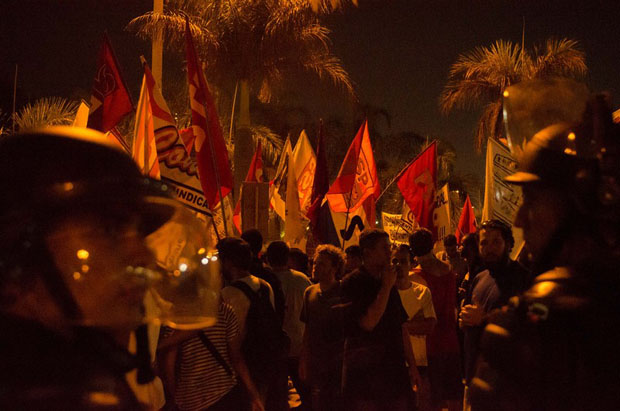Twitter users hijack #HelloBaku to shine spotlight on Azerbaijan’s human rights abuses

From top left: Arif Yunus, Rasul Jafarov, Leyla Yunus, Khadija Ismayilova, Intigam Aliyev and Anar Mammadli – some of the government critics jailed on trumped up charges in Azerbaijan
Social media users have hijacked the hashtag #HelloBaku to draw attention to human rights and free speech violations in Azerbaijan ahead of this summer’s inaugural European Games in the capital Baku.
Baku 2015 organisers launched the hashtag contest on 4 March 2015, as part of a promotional push ahead of the games, which start on 12 June. Social media users were invited to enter by posting a photo or video of themselves holding a sign with #HelloBaku written on it. The winner, set to be announced this week, will be awarded two tickets to the opening ceremony, as well as a night at a luxury hotel and flights.
Post a photo of you saying #HelloBaku to win tickets to @BakuGames2015 opening ceremony! ✈️ http://t.co/2VMRbqux92 pic.twitter.com/CURPEEa0AL
— 2015 European Games (@BakuGames2015) March 20, 2015
But the campaign backfired, as a number of social media users instead used #HelloBaku to highlight Azerbaijan’s poor record on human rights. According to the latest estimates, there are over 100 political prisoners in the country. Since last summer, authorities have been engaged in an unprecedented onslaught against its most prominent critics, jailing investigative journalist Khadija Ismayilova, pro-democracy activist Rasul Jafarov, human rights lawyer Intigam Aliyev and others on trumped up charges. On 9 April, prosecutors asked for a 9-year sentence for Jafarov, who stands accused of tax evasion and malpractice, among other things.
#HelloBaku hashtag seems to have drawn more attention to Azerbaijan’s record of alleged rights abuses than its hosting of European Games — Thomas Grove (@tggrove) April 4, 2015
#HelloBaku: Free jailed activists and journalists so Index’s @jodieginsberg can say hello to them too pic.twitter.com/dy8q3lzni4
— Index on Censorship (@IndexCensorship) March 31, 2015
.@biginbaku What else is on offer in #HelloBaku? Journalists, bloggers in prison, crackdown on government critics. pic.twitter.com/rKx9AwTCPs — Wenzel Michalski (@WenzelMichalski) March 26, 2015
#HelloBaku @amnesty: “No one should be fooled by glitz & glamour…#Azerbaijan is putting on” http://t.co/Ekz1JFGUIO pic.twitter.com/dqTd5wBt68 — Kate Nahapetian (@KN87) March 23, 2015
My friend @Khadija0576 is in prison. Human rights worker Leyla Yunus, Prof Intigam Aliyev are in prison. Give them a ticket out. #HelloBaku — Shabnam (@Peaceweet) March 24, 2015
Must-read for @UNICEF @BP_plc @CocaCola http://t.co/N22wvofeRF #HelloBaku + video with @dinarayunus https://t.co/iZTYgxl79r #Baku2015 — Jan Kooy (@KooyJan) April 7, 2015
#HelloBaku: Big court day today; @rasuljafarov & lawyer Khalid Bagirov in court now and at 15:00 IRFS will be in court #Azerbaijan — Human Rights Houses (@HRHFoundation) April 9, 2015
#HelloBaku: European Olympic Committee Urged to Press #Azerbaijan’s Crackdown on Opposition https://t.co/Le6O2s7deg #Baku2015 #EuropeanGames — Ani Wandaryan (@GoldenTent) April 7, 2015
Trial in the case of Intigam Aliyev #Azerbaijan #HelloBaku #RealBaku2015 #SportForRight #FreeIntigam #HelloBaku http://t.co/p1XMyLcve0 — HUMAN RIGHTS (@azhumanrights) April 9, 2015
#HelloBaku, Hello From Prison. #realBaku2015 #Azerbaijan #Baku2015 #freeLeyla #freeKhadija https://t.co/fNDKVEckWI pic.twitter.com/jeSZqezllj — STOPREPRESSIONS (@stoprepressions) April 3, 2015
5 April 2015 #Azerbaijan‘i opposition holds rally. #Baku2015 #HelloBaku #RealBaku2015 #SportForRights #Talanason pic.twitter.com/uWQ4hjNRLB — AXCP PRESS CENTER (@A_X_C_P) April 6, 2015
New sport and rights coalition calls for prisoner releases ahead of #BakuGames #Azerbaijan #HelloBaku http://t.co/24KREfFc2P — Nizami Abdullayev (@NizamiHR) April 9, 2015
Prisoner of conscience Leyla Yunus ill in prison. #Azerbaijan should free her now. #HelloBaku? http://t.co/PY31EFNF6T pic.twitter.com/PpzmJXkvxv — Andrew Stroehlein (@astroehlein) March 24, 2015
#HelloBaku Azerbaijan: release of all prisoners of conscience https://t.co/d1GM0dHQNN #Baku2015 pic.twitter.com/4xG9Y3K58q — Amnesty NL (@amnestynl) March 23, 2015
in Azerbaijan have 101political prisoners !Guys people do not need these Olimpic @BakuGames2015 !The people in terrible condition #HelloBaku — Sevinj NM (@SevinjNM) April 7, 2015
Love this photo, which captures the contrasts of life in #Baku, #Azerbaijan via @MeydanTV #HelloBaku pic.twitter.com/7v5LDz2cxo — Rebecca Vincent (@rebecca_vincent) March 22, 2015
On 30 March, the same day the contest closed, Human Rights Watch researcher Giorgi Gogia, who was set to attend the trial hearing of Aliyev and Jafarov, was blocked from entering Azerbaijan. Traveling from his native Georgia, Gogia does not require a visa to go to Azerbaijan. Despite this, his passport was taken away and he was held at the Heydar Aliyev International Airport in Baku for 31 hours without explanation, before being sent back to Tbilisi.
My account of 31-hour ordeal at #Baku airport. Happy to be home, but sad for jailed rights defenders in #Azerbaijan https://t.co/qmKF9yhiRM — Giorgi Gogia (@Giorgi_Gogia) March 31, 2015
Repression in #Azerbaijan no #AprilFools joke: @HRW‘s @Giorgi_Gogia airport ordeal https://t.co/ww4CBuTEa3 #HelloBaku pic.twitter.com/aihfMV2zSu — Minky Worden (@MinkysHighjinks) April 1, 2015
Will @BakuGames2015 RT this latest on #Azerbaijan‘s crackdown on human rights? http://t.co/swQttNqru1 #HelloBaku pic.twitter.com/vwlVzVzg8J — EmmaDaly (@EmmaDaly) April 1, 2015
Azerbaijan’s authorities, led by President Ilham Aliyvev, have been accused by human rights groups of running an expensive international PR operation to whitewash rights violations, and present the country as a “modern, outward looking state“. According to the Baku European Games Operation Committee (BEGOC), the games will “showcase Azerbaijan as a vibrant and modern European nation of great achievement”.
#HelloBaku MT @GoldenTent: #EuropeanGames aren’t sporting event but expensive propaganda – @eminmilli http://t.co/oW6fQ8BoRa #Azerbaijan — Florian Irminger ✏️ (@FlorianIrminger) April 6, 2015
London-based marketing firm 1000heads, whose clients include Yahoo, Procter & Gamble and Lego, worked with Baku 2015 organisers on #HelloBaku. Index contacted 1000heads to ask whether they were aware of criticisms against Azerbaijan’s human rights record before taking on the job, and their response to the hijacking of the hashtag.
“We were working with BEGOC, the Baku European Games Operation Committee, which is responsible for delivering the event for athletes from the 49 National Olympic Committees of Europe. We are no longer involved,” 1000heads CEO Mike Rowe said in an email.
This article was posted on 8 April 2015 at indexoncensorship.org

